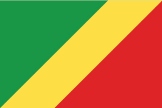Security Status
- Normal precautions
- High degree of caution
- Avoid non-essential travel
- Do not travel
- Overview
- Safety and Security
- Local Laws and Customs
- Health
- Additional Information
- Embassy Contact
Overview
Overview
Overview
Security Status
High Degree of Caution
Latest Travel Alert
Following recent events concerning the Republic of Congo (also known as Congo-Brazzaville), Irish citizens are advised to exercise caution while in the country, with additional attention to personal safety required.
The Department of Foreign Affairs advises against all travel to the area within 50km of the border with Central African Republic.
The Department of Foreign Affairs advises against non-essential travel to the Pool (except Brazzaville) and eastern Bouenza regions.
Citizens in the country are advised to be vigilant, keep up to date with local developments, and avoid any demonstrations and large gatherings. Irish citizens in Congo-Brazzaville or intending to travel to the country should ensure that they have registered with the Department of Foreign Affairs.
Citizens in need of consular assistance should contact the Department of Foreign Affairs.
COVID-19 Entry Requirements
While there are currently no specific entry requirements related to COVID-19, travellers between regions of the Republic of Congo may be required to present a negative COVID-19 test result that is dated within three days before the date of travel within the country.
General Travel Advice
Irish citizens require a visa to enter the Republic of Congo.
A valid passport is required for travel to the Republic of Congo Irish passports should have a minimum validity of six months after the confirmed date of departure from Congo. Passport cards cannot be used.
Visitors to Republic of Congo are advised to follow the guidance of national and local authorities and stay fully informed of what is going on by monitoring local and international news and social media.
As there is a risk of yellow fever and polio, among others, citizens are advised to check what vaccinations they may need for their trip to the Republic of Congo at least eight weeks before travel. They can get information about vaccinations from their local GP or an International Health and Travel Centre.
Emergency Assistance
The resources of emergency services in the Republic of Congo are limited and the response times can be protracted. The best help is often close at hand so if you have problems, talk initially to your local contacts, tour operator representative or hotel management.
Our tips for Safe Travels:
- Get comprehensive travel insurance that covers all your planned activities.
- Register your details ahead of your travel to the Republic of Congo with us so that we can contact you quickly if there is an unforeseen circumstance like a natural disaster or a security situation.
- Follow us on twitter @dfatravelwise for the latest travel updates.
- Read our ‘Know Before You Go’ guide.
As there is no Embassy of Ireland in Republic of Congo (Brazzaville), we are limited in the help we can offer you in an emergency. However, if there is an emergency, or if you need help and advice, you can contact our Consular Assistance Unit at the Department of Foreign Affairs in Dublin on +353 1 408 2000.
Safety and Security
Safety and Security
Local Laws and Customs
Local Laws and Customs
Health
Health
Health
Get travel and medical insurance
Before travelling, the Department strongly recommends that you obtain comprehensive travel insurance which will cover all overseas medical costs, including medical repatriation/evacuation, repatriation of remains and legal costs. You should check any exclusions and, in particular, that your policy covers you for the activities you want to undertake.
Vaccinations
Check what vaccinations you may need for your trip at least eight weeks before you travel. We can’t advise you on vaccinations, but you can get information about vaccinations from your local GP or an International Health and Travel Centre.
Evidence of vaccination (in the form of a certificate) can be a requirement for entry to some countries.
Medication
Make sure you bring enough medication for your entire trip and for any unexpected delays. You may wish to also bring copies of your prescription in case you lose your medication.
Additional Information
Additional Information
Additional Information
Passports
It’s advisable to take a number of photocopies of your passport with you when travelling to the Republic of the Congo and you should carry a photocopy of your passport at all times during your stay.
If your passport is lost or stolen while you’re abroad, we can help.
What we can do:
- Issue you a replacement passport that will let you finish your trip, or;
- Issue you with an emergency travel document to get you home.
We’ll do our best to help you as quickly as possible but this can take some time. Your location and circumstances may limit the help we can give you. As Ireland does not have an Embassy or Consulate in the Republic of the Congo there may be additional complications in processing and application for a new passport.
You should contact the nearest Irish Embassy or Consulate to find out what you need to do to apply for a passport. They will also be able to advise you on the fees which apply.
Embassy contact
Embassy Contact
Please contact our Consular Assistance Unit if you need guidance on the nearest assistance and we will help you as best we can.
Our number is: +353 1 408 2000.
Department of Foreign Affairs
Iveagh House
80 St Stephen’s Green
Dublin 2
D02 VY53
Tel: + 353 (0) 1 408 2000
24 hours a day, 7 days a week




